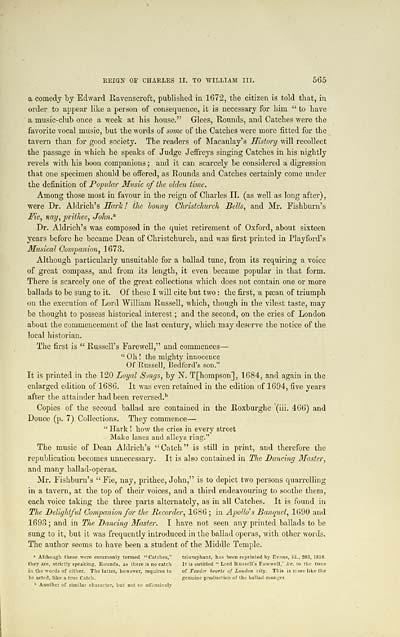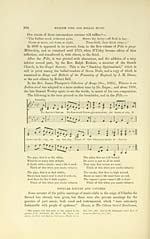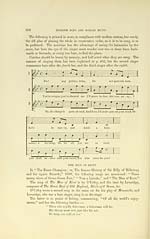Glen Collection of printed music > Printed text > Popular music of the olden time > Volume 2
(189) Page 565
Download files
Complete book:
Individual page:
Thumbnail gallery: Grid view | List view

REIGN OF CHARLES II. TO WILLIAM III. 565
a comedy by Edward Ravenscroft, published in 1672, the citizen is told that, in
order to appear like a person of consequence, it is necessary for him " to have
a music-club once a week at his house." Glees, Rounds, and Catches were the
favorite vocal music, but the words of some of the Catches were more fitted for the
tavern than for good society. The readers of Macaulay's History will recollect
the passage in which he speaks of Judge Jeffreys singing Catches in his nightly
revels with his boon companions ; and it can scarcely be considered a digression
that one specimen should be offered, as Rounds and Catches certainly come under
the definition of Popular Music of the olden time.
Among those most in favour in the reign of Charles II. (as well as long after) ,
were Dr. Aldrich's Hark! the bonny Christchurch Bells, and Mr. Fishburn's
Fie, nay, prithee, John*
Dr. Aldrich's was composed in the quiet retirement of Oxford, about sixteen
years before he became Dean of Christchurch, and was first printed in Playford's
Musical Companion, 1673.
Although particularly unsuitable for a ballad tune, from its requiring a voice
of great compass, and from its length, it even became popular in that form.
There is scarcely one of the great collections which does not contain one or more
ballads to be sung to it. Of these I will cite but two : the first, a paean of triumph
on the execution of Lord William Russell, which, though in the vilest taste, may
be thought to possess historical interest ; and the second, on the cries of London
about the commencement of the last century, which may deserve the notice of the
local historian.
The first is " Russell's Farewell," and commences —
" Oh ! the mighty innocence
Of Russell, Bedford's son."
It is printed in the 120 Loyal Songs, by N. T[hompson], 1684, and again in the
enlarged edition of 1686. It was even retained in the edition of 1694, five years
after the attainder had been reversed. 1 "
Copies of the second ballad are contained in the Roxburghe '(iii. 466) and
Douce (p. 7) Collections. They commence —
" Hark ! how the cries in every street
Make lanes and alleys ring."
The music of Dean Aldrich's "Catch" is still in print, and therefore the
republication becomes unnecessary. It is also contained in The Dancing Master,
and many ballad-operas.
Mr. Fishburn's "Fie, nay, prithee, John," is to depict two persons quarrelling
in a tavern, at the top of their voices, and a third endeavouring to soothe them,
each voice taking the three parts alternately, as in all Catches. It is found in
The Delightful Companion for the Recorder, 1686 ; in Apollo'' s Banquet, 1690 and
1693 ; and in The Dancing Master. I have not seen any printed ballads to be
sung to it, but it was frequently introduced in the ballad operas, with other words.
The author seems to have been a student of the Middle Temple.
n Although these were commonly termed "Catches," triumphant, has been reprinted hy Evans, iii., 203, 1810.
they are, strictly speaking, Rounds, as there is no catch It is entitled " Lord Russell's Farewell," &'c. to the tune
in the words of either. The latter, however, requires to of Tender hearts of London city. This is more like the
be acted, like a true Catch. genuine production of the ballad-monger.
b Another of similar character, but not so offensively
a comedy by Edward Ravenscroft, published in 1672, the citizen is told that, in
order to appear like a person of consequence, it is necessary for him " to have
a music-club once a week at his house." Glees, Rounds, and Catches were the
favorite vocal music, but the words of some of the Catches were more fitted for the
tavern than for good society. The readers of Macaulay's History will recollect
the passage in which he speaks of Judge Jeffreys singing Catches in his nightly
revels with his boon companions ; and it can scarcely be considered a digression
that one specimen should be offered, as Rounds and Catches certainly come under
the definition of Popular Music of the olden time.
Among those most in favour in the reign of Charles II. (as well as long after) ,
were Dr. Aldrich's Hark! the bonny Christchurch Bells, and Mr. Fishburn's
Fie, nay, prithee, John*
Dr. Aldrich's was composed in the quiet retirement of Oxford, about sixteen
years before he became Dean of Christchurch, and was first printed in Playford's
Musical Companion, 1673.
Although particularly unsuitable for a ballad tune, from its requiring a voice
of great compass, and from its length, it even became popular in that form.
There is scarcely one of the great collections which does not contain one or more
ballads to be sung to it. Of these I will cite but two : the first, a paean of triumph
on the execution of Lord William Russell, which, though in the vilest taste, may
be thought to possess historical interest ; and the second, on the cries of London
about the commencement of the last century, which may deserve the notice of the
local historian.
The first is " Russell's Farewell," and commences —
" Oh ! the mighty innocence
Of Russell, Bedford's son."
It is printed in the 120 Loyal Songs, by N. T[hompson], 1684, and again in the
enlarged edition of 1686. It was even retained in the edition of 1694, five years
after the attainder had been reversed. 1 "
Copies of the second ballad are contained in the Roxburghe '(iii. 466) and
Douce (p. 7) Collections. They commence —
" Hark ! how the cries in every street
Make lanes and alleys ring."
The music of Dean Aldrich's "Catch" is still in print, and therefore the
republication becomes unnecessary. It is also contained in The Dancing Master,
and many ballad-operas.
Mr. Fishburn's "Fie, nay, prithee, John," is to depict two persons quarrelling
in a tavern, at the top of their voices, and a third endeavouring to soothe them,
each voice taking the three parts alternately, as in all Catches. It is found in
The Delightful Companion for the Recorder, 1686 ; in Apollo'' s Banquet, 1690 and
1693 ; and in The Dancing Master. I have not seen any printed ballads to be
sung to it, but it was frequently introduced in the ballad operas, with other words.
The author seems to have been a student of the Middle Temple.
n Although these were commonly termed "Catches," triumphant, has been reprinted hy Evans, iii., 203, 1810.
they are, strictly speaking, Rounds, as there is no catch It is entitled " Lord Russell's Farewell," &'c. to the tune
in the words of either. The latter, however, requires to of Tender hearts of London city. This is more like the
be acted, like a true Catch. genuine production of the ballad-monger.
b Another of similar character, but not so offensively
Set display mode to: Large image | Transcription
Images and transcriptions on this page, including medium image downloads, may be used under the Creative Commons Attribution 4.0 International Licence unless otherwise stated. ![]()
| Special collections of printed music > Glen Collection of printed music > Printed text > Popular music of the olden time > Volume 2 > (189) Page 565 |
|---|
| Permanent URL | https://digital.nls.uk/91364262 |
|---|
| Shelfmark | Glen.254a |
|---|---|
| Additional NLS resources: | |
| Attribution and copyright: |
|
| Description | Scottish songs and music of the 18th and early 19th centuries, including music for the Highland bagpipe. These are selected items from the collection of John Glen (1833 to 1904). Also includes a few manuscripts, some treatises, and other books on the subject. |
|---|
| Description | The Glen Collection and the Inglis Collection represent mainly 18th and 19th century Scottish music, including Scottish songs. The collections of Berlioz and Verdi collected by bibliographer Cecil Hopkinson contain contemporary and later editions of the works of the two composers Berlioz and Verdi. |
|---|

